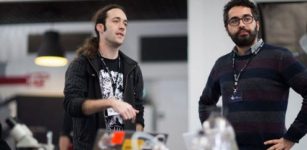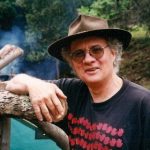Democratising Science: An Interview with BioFoundry’s Meow

Biohacking is a rather recent phenomena. It’s a kind of do-it-yourself biotechnology that people are conducting in small labs outside the boundaries of universities and research institutions. A social movement where people are taking responsibility for biological breakthroughs themselves.
Without the oversight of a professor or the focus of a research project, citizens are free to follow their own curiosity whilst dabbling with modifying living organisms to see what sort of outcomes their experiments will result in.
There are two main streams of biohacking. One is focused on biology that is outside of oneself. A person might meddle with some yeast and create glow in the dark beer. The other is aimed at hacking at an individual’s own body, such as implanting magnets in your fingertips.
Biohacking in Sydney
These open science spaces – that are bringing biotechnology to the public – are springing up around the globe. There’s BioCurious in San Francisco, La Paillasse in Paris and Genspace in New York. And there’s one such lab right here in Sydney that’s been operating for close to half a decade.
BioFoundry operates out of the Australian Technology Park. It’s the country’s first community lab accessible for “citizen scientists.” And their mission is to “democratise science” by breaking the “cost entry barrier to science education and research.”
While the idea of DIYbio might make some people edgy, when you take look at their website you find listed amongst the projects under development: health-safe anti-mould paint, non-animal derived cell culture medium and single-use plastic made from commercial kitchen waste.
Mr Meow-Meow
Meow-Ludo Disco Gamma Meow-Meow is one of the co-founders of BioFoundry. He’s a sort of a Che Guevara of the science world, bringing it back to the people, but using biotechnology as his tool, rather than an automatic rifle.
Meow (for short), along with co-founder Maria Oh and Adrian Pearce, started the enterprise initially in Stanmore. In the beginning Meow was growing bioluminescent mushrooms, but these days he’s home brewing insulin to help people in developing countries.
But he’s not only a biotechnologist and futurist, he’s also a politician. Meow was a candidate for the Science party in the seat of Grayndler at last July’s federal election. And he was up against the likes of Anthony Albanese.
Parliamentary science
The Science party want to make the scientific approach part of the parliamentary process. They believe that technology has improved the lot of humanity and a greater application of it will bring “higher quality of life, greater knowledge, and greater participation in democracy.”
Sydney Criminal Lawyers® spoke with Meow about what it’s like to take biotechnology into your own hands in a grassroots and politicised manner.
So firstly, Meow you’re a biohacker. What exactly is biohacking?
Biohacking is a big umbrella term. The part of it that I really practice is taking a computer hacking kind of approach to molecular biology.
Now what that means is, we don’t necessary have hypothesis driven experiments, like you might at university. We take a tinkering approach to biology. So we change things around and see what happens.
Biohacking is broad though, so it’s takes on everything from dieting, through to molecular biology, through to body modification.
You founded BioFoundry: Australia’s first community lab. Can you tell us a little bit about how it all came about?
Academically, I wasn’t exactly a stellar student. So I had quite a low average mark. My average was sitting around the fail. And I was really passionate about molecular biology and biotechnology. But my score didn’t reflect that.
So I was thinking there wasn’t much chance for me to ever get a job in science, because there’s so few jobs, and it’s very competitive.
I felt the best way for me to differentiate myself from other graduates would be showing off what my strengths were. And that was in creativity and in lab work.
Generally, that’s not really assessed at uni though, they always test what you don’t know, rather than what you do know.
So that basically led me to start building my own lab at home and then I saw other people around the world doing this thing and that’s the biohacking movement, or DIYbio. Then we started having meetings.
And after about two years of having meetings and understanding the legal landscape, and being in contact with the government – with the Office of the Gene Technology Regulator – we ended up setting up in Stanmore.
So we basically founded the first biohack space.
And you wanted to get PC1 certification for your lab. Did you get that in the end?
Yeah, so we’ve had two spaces PC1 certified now. But we’ve currently got one space certified.
What does that certification do for you?
PC1 is non-permanent genome modification. There are exceptions to that. But basically the modifications I make are like an add-on or an app for a phone that can be deleted later on.
So when we make modifications to organisms, if they reproduce they generally don’t pass it on. Or if they do, it gets deleted in the next generation.
I can work with simple viruses as well, which is pretty exciting. But the one big thing I can’t work with is plants.
And what sort of projects is BioFoundary currently working on?
BioFoundary is working on getting its store set up – that’s BioFoundary itself.
We believe that the most important thing to democratise science at the moment is actually make scientific reagents and equipment available at low cost to schools and the public.
BioFoundary is this place where you can do projects. But BioFoundary itself does very little though. It’s just basically the lab.
My personal project that I’m working on is a yeast that makes palm oil from waste food products. So we’ve just gotten our first successful palm oil out of that, which has some pretty exciting environmental potential.
One start-up just got launched, which was making bioplastics from prawn shells.
We’ve got another group that is working on making some websites that allow you to learn how to culture organisms, so it’s kind of an educational outreach.
And my latest pet project, at the moment, is I’m making a martian terrarium that replicates what a greenhouse on Mars would be like. That should be ready in the next couple of weeks.
So you’re talking about biotechnology and conducting genetic experiments. There’s a lot of people who criticise this sort of science – especially when it comes to genetically modified foods.
Have you come up against any resistance to what you’re doing?
Yeah, we have actually. So Friends of the Earth have protested at our event before. They were quite agro at the very beginning. But they ended up staying for our whole event. We spoke to them. And they actually said they were quite impressed about how much we knew about the law.
We definitely know more about the legislation, than our opposition.
We actually get a lot of opposition from academics as well. They don’t believe that this technology should be played with by the general public.
Ultimately though, we are under the same legislation that any academic or research institution or industry is under. The only difference is that we encourage the public to come and do it.
So we’re still subject to the same laws.
I can definitely understand why people are scared though. Even within our community, there’s people that don’t agree with genetically modified food, for example.
I think the best thing is to open up the floor to conversations, where everyone can come and learn about it. They can actually made GMOs if they want and then make the decisions after that.
So you’re talking about democratising science and making it more accessible to the public. So do you feel that science and scientific research are currently too restricted by governments and their institutions? And if so, what does this control do to the field of science?
This actually touches on a few different areas. So one of the big areas is where the funding goes. There’s very little money for research in Australia and it’s fought over really competitively. And it edges people like myself out.
I don’t agree with the way that people do research and publish, then it goes into a journal that I have to pay for.
It’s quite elitist and exclusionary. Often just being able to make friends as an academic means that you’re more likely to get honours or a postgraduate position, rather than how good you are at what you do. Some universities get called old boys clubs because of the way that it’s restricted.
I think by removing those barriers – those cost and technological barriers for studying science – you give people the freedom to be able to study what they want and how they want.
The money is the hardest thing to find. So that’s why we’re quite commercial. So we try and partner with industry to fund the research that we’re interested in.
Last year, you ran in the seat of Grayndler in the federal election for the Science party. Anthony Albanese was contending the same seat. How did you fare?
I came fifth out of eleven, which was a really good performance, as it was the first time I’d ever run in an election. And it was the first time we’d run lower house candidates in the elections.
I think lower house is a lot harder than the Senate. To run lower house seats means that you’re a serious political party. If I can double just a bit more than I got, I’ll be happy in the next election. I’m going for 4 percent.
This is the safest seat in the country for Labor. Anthony Albanese won on primary votes alone. He got over 50 percent. He’s well-loved here, and with good reason.
But it’s important for scientists, during the elections, not to just send letters. But to go out into the community, run against them and hold them to account for their policies.
Once Albo goes, this seat will go Green, or it will go to the Science party.
So who are the Science party? And what do they stand for?
The reason I joined the Science party is that they are a radical centrist party. So they’re not left or right. They make decisions based on evidence and recommendations from experts.
The idea is that we should settle things without ideology, and instead look to the facts.
The core components that stuck out for me when I was interested in the Science party were treaty – a document with Aboriginal people. Their space policy was a big one. And then I thought that they had really sensible energy portfolios and ways of approaching energy.
Liberal, Labor and the Greens aren’t scientific parties. They pick and choose the science to suit them.
So Greens claim to take a really sensible approach to renewables and energy targets. But they ignore all the science on GMOs. They ignore the science on nuclear power. Because it doesn’t fit their rhetoric.
And from a science perspective, it actually makes them no better than Liberal or Labor. They selectively pick the science they want. Like the Liberals will pick the economics that suits them.
You should go check out our space policy and that will really inspire you. It is one of the greatest pieces of policy I’ve seen written.
Basically, independent academics have said that any party that’s in power can take this and make Australia really prosperous over the next twenty years. Because it’s going to be a one trillion dollar industry across the next twenty years.
Canada has done exactly what we’ve recommended and they’ve had astronauts on the international space station.
So you recommend that scientific research and technology should be integrated more into the realm of politics? How do you propose that would happen?
One of the big problems at the moment is that often decisions are made before they’ve gone to consultation. So look at things like Westconnex. The independent environmental assessment hadn’t been completed before people had been paid, and the money had been divvied up for the project.
And this is done deliberately because it means that they can’t withdraw, because they have a sunken cost in the project.
I know a lot of people in the industry that speak to people who do government tenders and it’s the same situation. Often they’ve been paid off, or they’ve got friends in the industry, and they’ve gone and done business before.
Ideally, I would like a lot of things settled by debate. I would look to experts to find answers to our questions. I mean we are having debates over things like equal marriage and climate change. And we know the answers to these questions. We have the evidence. We have the arguments sorted.
There’s no reason why these things shouldn’t be treated like realities. We’ve got studies that say equal marriage doesn’t ruin societies. We’ve got studies from politicians saying that drug decriminalisation doesn’t destroy societies, in fact, it is actually better for societies.
Once we have the evidence, and we see what the outcome is, we should be implementing that straight away.
You believe that over the last decade the Australian political climate has changed. In your opinion what sort of changes have happened? And what’s the state of the nation like today?
I actually caught up with Paul Keating not long ago and we were talking a little bit about it. And I think that Labor lost its vision. That was probably the biggest thing that happened across the decade.
I think that both the parties have moved towards the centre. Kevin Rudd was quite right wing. He was more like a neoliberal, than a true Labor politician. He’s quite conservative.
And then we have Malcolm Turnbull who’s actually quite liberal – little l – moving towards the centre.
And I feel like the best thing that’s happened over the last ten years is the emergence of ordinary people in politics. So we’ve seen people like Ricky Muir. We’ve got people like Jacqui Lambie. Even Clive Palmer to some degree.
When they go into parliament they actually represent us better than career politicians. So ordinary people. I disagree with 90 percent of what Jacqui Lambie says, but then the fact that she’s lived an ordinary life means she can get up and speak better on my behalf than someone who’s completely removed from me politically and ideologically.
But just her experience as an ordinary person, makes her represent me better.
And lastly, Meow-Ludo Disco Gamma Meow-Meow is quite a unique name. How did you come to have such a name?
I’d always wanted to change it since I was in high school. I thought it would be a fun experience. And my friends and I sat down and we wrote down a whole list of different names that we thought were funny.
Because it didn’t really matter what my name was, I just wanted to change it. To see what the experience was like.
And then after we had a big list, we just crossed them off. And we found the one that sounded the best. Obviously this one was good, and there were some hilarious other ones on there.
It was kind of fun and games, when I was 20. But then I think I grew into the name and I quite enjoyed it and it was a bit novel. And it’s nice to have a name that’s unique.
But it’s a bit of a blessing and a curse. If you go online, there’s only one of me. So you find everything out about me straight away. Whereas if you were John Smith, it would be quite hard to find out information about you.
So it can work kind of for or against you, depending on what people want to know.
Meow thanks so much for this enlightening conversation today. And best of luck with your future projects at BioFoundry.
It’s fine. No worries. It’s been my pleasure.
Photo credit: Meredith O’Shea







